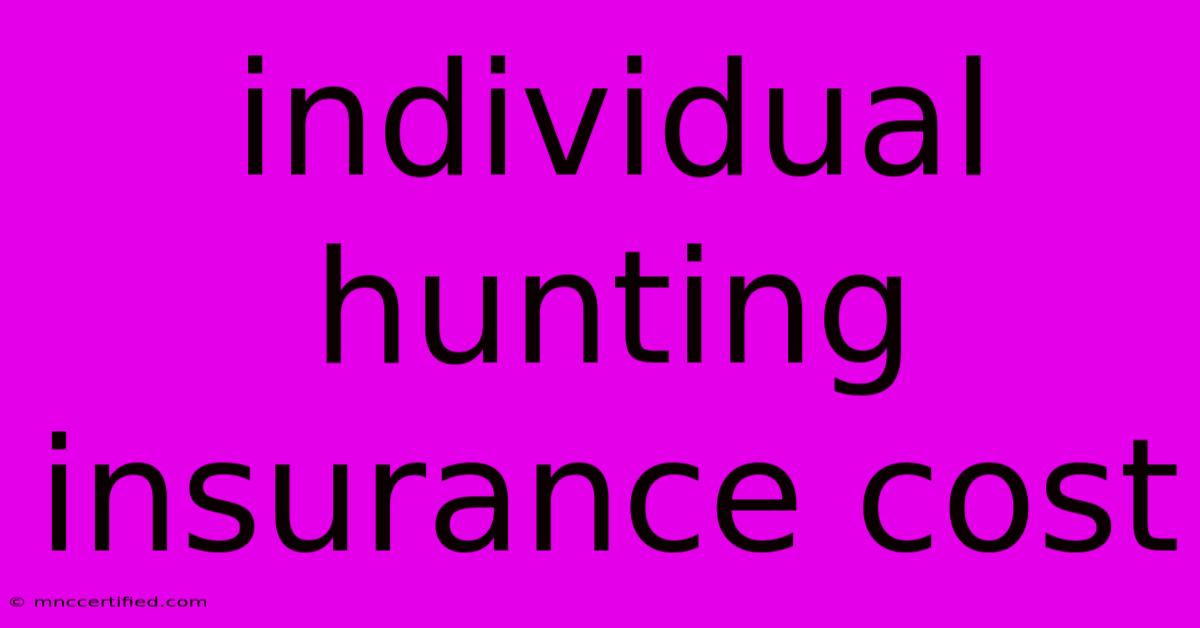Individual Hunting Insurance Cost

Table of Contents
Individual Hunting Insurance Cost: A Comprehensive Guide
Hunting is a beloved pastime for many, offering the thrill of the chase and the satisfaction of providing for oneself. However, it's a pursuit that carries inherent risks. Accidents can happen, and liability concerns are a serious consideration. That's why understanding the cost of individual hunting insurance is crucial before you head out into the woods. This comprehensive guide will break down the factors influencing the price and help you find the right coverage for your needs.
What Factors Determine the Cost of Hunting Insurance?
The cost of individual hunting insurance isn't a one-size-fits-all figure. Several factors influence the premium you'll pay:
1. Type of Coverage:
- Liability Insurance: This covers legal costs and damages if you accidentally injure someone or damage their property while hunting. This is often the most crucial aspect of hunting insurance.
- Accident Insurance: This covers medical expenses if you're injured during a hunting trip.
- Equipment Insurance: This covers damage or loss of your hunting equipment, such as firearms, bows, and other gear. This is less common but available through some providers.
- Comprehensive Policies: Some providers offer packages that bundle liability, accident, and possibly equipment coverage.
Choosing the right combination of coverage directly impacts your cost. Liability insurance is generally considered essential, while accident and equipment insurance are optional but offer added peace of mind.
2. Location:
Your hunting location plays a significant role. Hunting in areas with high litigation rates or specific regulations might result in higher premiums. Rural vs. urban hunting locations can also influence cost.
3. Hunting Activities:
The type of hunting you engage in matters. Bow hunting, for instance, may carry different risk assessments than rifle hunting, impacting the premium. The more dangerous the hunting activity, the higher the potential for claims and thus a higher premium.
4. Experience Level:
Your hunting experience can influence the cost. New hunters might face higher premiums as insurers perceive a greater risk of accidents. Providing proof of hunting safety courses can sometimes lower your premium.
5. Age and Health:
Similar to other insurance types, your age and health can influence the cost of hunting insurance. Older hunters or those with pre-existing conditions may face higher premiums.
6. Coverage Amount:
The amount of coverage you choose directly correlates with the cost. Higher coverage limits typically mean higher premiums, but they also provide greater financial protection.
How Much Does Individual Hunting Insurance Cost?
Unfortunately, there's no single answer to this question. Prices vary significantly depending on the factors mentioned above. However, you can expect to pay anywhere from $50 to $500 or more annually for a comprehensive policy. Getting quotes from multiple providers is crucial to finding the best value.
Finding the Right Hunting Insurance Provider:
Shopping around is essential. Compare quotes from several insurers, focusing on:
- Coverage options: Ensure the policy covers your specific needs and activities.
- Premium costs: Balance the cost with the level of coverage.
- Customer reviews: Check online reviews to gauge the insurer's reputation for claims handling.
- Policy exclusions: Pay close attention to what's not covered by the policy.
Don't hesitate to contact insurance providers directly with questions. Understanding the policy's nuances is crucial before committing.
Conclusion:
Individual hunting insurance is a vital investment for responsible hunters. While the cost varies, the peace of mind it provides is invaluable. By carefully considering the factors discussed above and comparing quotes from different insurers, you can find a policy that adequately protects you and fits your budget. Remember, preventative measures like attending hunter safety courses can also help lower your risk and potentially your premium. Prioritize safety and responsible hunting practices – it's the best way to enjoy the sport while minimizing risks.

Thank you for visiting our website wich cover about Individual Hunting Insurance Cost. We hope the information provided has been useful to you. Feel free to contact us if you have any questions or need further assistance. See you next time and dont miss to bookmark.
Featured Posts
-
Rooney On Wagatha Christie Nightmare
Nov 19, 2024
-
Croatia Vs Portugal Live Uefa Nations League
Nov 19, 2024
-
Afcon 2025 Nigeria Vs Rwanda Match Result
Nov 19, 2024
-
Who Normally Pays Title Insurance
Nov 19, 2024
-
England Youth Carsleys Foundation Built
Nov 19, 2024